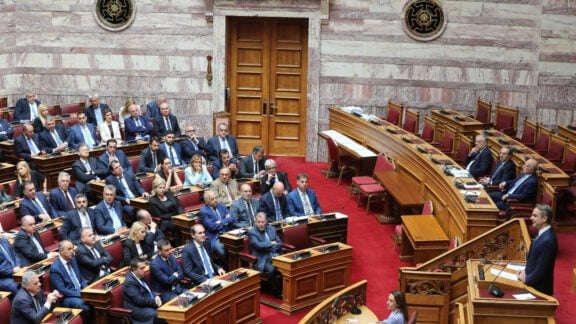In 2009, the newly elected centre left PASOK Greek government imposed austerity measures demanded by the dreaded ‘troika’, made up of the EU Commission, EU Bank and IMF.
These draconian measures were continued under the centre right New Democracy government which came to power in 2012.
The impact of these policies was so severe that Greece’s GDP plummeted by a quarter between 2009 and 2015.
Its household income dropped by more than a third and its unemployment rate trebled to 26 per cent. Youth unemployment is over 50 per cent.
One third of the population have lost their social security and health insurance and live below the poverty line. Suicide rates have doubled. When I visited Greece last year I saw more beggars than I have ever seen in Athens.
And no wonder – it’s estimated 18 per cent of the population is unable to afford basic food needs and huge numbers rely on soup kitchens for a meal.
Greece was the birthplace of democracy, and given the suffering of its citizens in the last six years, the world should celebrate the election of its new, radical-left SYRIZA government led by 40-year-old Alexis Tsipras, who promises to discontinue the austerity measures.
Greeks could just as easily have voted for the right wing neo-fascist Golden Dawn Party, which made the same promise. Golden Dawn did get six per cent of the vote but SYRIZA received 36 per cent.
New Democracy, which supported austerity, attracted 28 per cent and the PASOK Party, which five years ago ran Greece, managed a paltry five per cent.
Despite only gaining 36 per cent, SYRIZA came within two seats of an absolute majority thanks to a new electoral law implemented in 2012. That law introduced ‘reinforced proportionality’, under which the party which gains the highest proportion of the vote is allocated an additional 50 seats in parliament.
This meant SYRIZA won 99 seats in the 300 member parliament and was allocated the additional 50 seats, bringing it just shy of a majority. SYRIZA has struck a deal with the Independents Party, which gained 13 seats, to form government.
This rise of the radical left in Greece has been met with nervousness in financial markets and among centrist parties.
But a shift to the left in Europe is better than the alternative. In France and Germany it is the neofascist National Front and NDP parties which are gaining prominence.
Newly elected Greek Prime Minister Tsipras wants a large part of the debilitating debt, which now stands at $448 billion, or 175 per cent of GDP, to be forgiven (by contrast Australia’s debt is 11 per cent of GDP). Tsipras points to the fact that Germany, the country most insistent on Greece paying its debts, was forgiven more than half its war debts in 1953.
Germany was forgiven huge amounts of post-war debt even before 1953 and under the London Debt Agreement Germany did not have to repay debt unless it achieved growth and trade benchmarks. This made it in the interests of Germany’s debtors to help it grow and by 1959 Germany had a debt to GDP ratio of less than six per cent.
Tsipras is asking Germany to return the favour that the allies heaped upon it after the war.
He wants debt forgiveness and he wants future interest payments tied to economic growth. But he is not just asking. He is demanding a reduction of debt and a discontinuance of key austerity measures.
He wants to raise the minimum wage from $825 to $1,070 a month, increase the lowest pensions, provide coupons for food and electricity for 300,000 households, provide access to free medical care and scrap heating fuel tax.
He has also promised to cut tax fraud, smuggling, corruption and the black market which is endemic in the Greek economy.
This ’emergency’ plan will cost $17 billion which the country does not have and is unlikely to be able to borrow at affordable rates without troika help.
Whether the Germans and their European partners in the troika have enough foresight to help ease the financial burden on Greece or whether they will insist on current arrangements even if Greece is forced out of the eurozone remains to be seen.
Either way the stakes are exceptionally high. If Greece is forgiven debt and austerity requirements are relaxed the other debtor nations in the EU such as Italy, Spain and Portugal may demand the same.
If Greece is forced out it would default on its debt, its creditors would lose their money and Europe would be destabilised.
These are challenging times for Europe. Many of its member nations are on the brink of bankruptcy and are struggling to control growing fascist movements.
If Greece is not dealt with fairly and its people given some respite, the whole of Europe may pay a very high price indeed.
* Theo Theophanous is a former Victorian govenment minister and political commentator.








